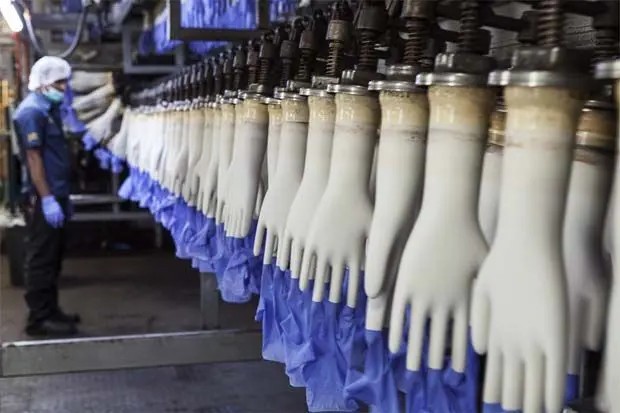
KUALA LUMPUR: Certain industries, particularly the technology and glove sectors, are showing strong potential despite the recent 24 per cent reciprocal tariffs imposed by the US on Malaysian exports, according to analysts.
Malacca Securities said some of the segments are being exempted from the tariff, such steel or aluminium articles, and autos or parts that already subject to tariffs, as well as copper, pharmaceuticals, semiconductors and lumber.
Given that the tariffs imposed on Malaysia are significantly lower than those on other Asean countries and China, the firm said Malaysian gloves and technology manufacturers could potentially gain an advantage, at least in the near term.
"A weaker ringgit may benefit export-oriented stocks, such as gloves and technology, and benefit the country as a whole due to being labelled as export-oriented nation," it added.
Meanwhile, Phillip Research Sdn Bhd said the tariff differential between China and Malaysia gloves has widened to 80 per cent from 50 per cent earlier this year, creating a favorable advantage for Malaysian glovemakers.
The firm explainted that the Chinese gloves entering the US now face a total tariff of 104 per cent, hence the sharp increase in costs for Chinese imports is expected to shift demand towards alternative suppliers, particularly those in Malaysia.
"With the US accounting for 24 per cent to 50 per cent of total sales for local glove manufacturers, we foresee stronger demand benefiting the domestic glove industry," it added.
CGS International Research, however, cautioned on the potential offsetting effect as Chinese glove makers are likely to channel their excess inventory into non-US markets, which is 70 per cent to 75 per cent of global glove consumption, driving down prices there.
On the tech sector, Philip Capital said the temporary exclusion of semiconductors from new US tariffs alleviates immediate concerns but it remains vigilant for potential future tariff risks.
"The lingering uncertainty over potential sector-specific tariffs on semiconductors may continue to weigh on investor sentiment.
"With earnings recovery expectations repeatedly deferred, valuation multiples could stay derated for longer.
"Meanwhile, tariff risks may prompt global multinational companies to delay or scale back capital expenditure spending, increasing the risk of further order slowdowns," the firm added.
Malacca Securities noted that the collaboration between the Malaysian government and UK-based Arm Holdings is expected to drive growth in the technology sector, potentially boosting local technology firms and attracting greater foreign investment in advanced chip design.
"Also, the KL20 summit and the National Semiconductor Strategy position Malaysia as a prominent player in the global semiconductor industry, which may benefit the technology sector, including electronics manufacturing services players," the firm said.
Malacca Securities also said that the multinational companies are increasingly diversifying supply chains into Southeast Asia, with Malaysia benefiting from its strong infrastructure and workforce.
"Key sectors like electrical and electronics, electric vehicles and renewables will benefit from sustained foreign direct investment inflows.
"Companies like Google, Nvidia and Microsoft have invested in Malaysia, reflecting growing confidence in the country's economic potential," it added.
Source: https://www.nst.com.my/business/economy/2025/04/1197866/technology-glove-among-sectors-thriving-under-us-tariffs

